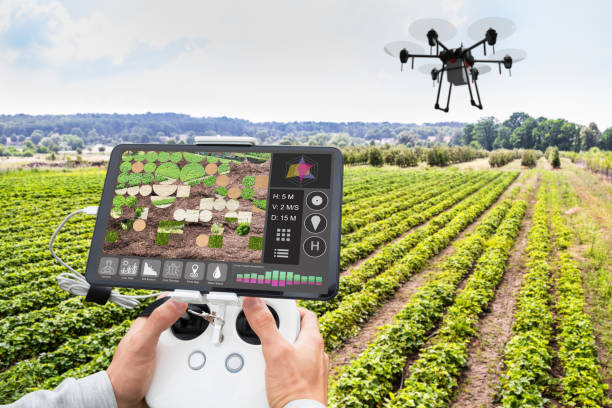Agriculture in Africa is a cornerstone of its economies, and artificial intelligence (AI) emerges as a transformative force. In a context where yield, social impact, and environmental footprint are at the forefront of concerns, integrating AI into sustainable agricultural practices in Africa raises hopes and questions. Is it a utopian vision or an impending reality?
The Transformative Potential of AI in Agriculture
AI opens unprecedented horizons for African agriculture, with applications ranging from weather forecasting to optimized resource management. Machine learning systems can now predict climatic hazards with unprecedented precision, allowing farmers to plan seeding and harvesting more effectively. Sensors and drones, combined with intelligent algorithms, provide precision monitoring of crops, diagnosing water and nutrient needs, early disease detection, and optimizing pesticide use.
Ethical and Social Challenges
However, adopting AI in African agriculture is not without ethical and social questions. The digital divide risks exacerbating existing inequalities between farmers who have access to these technologies and those who do not. There is also a risk that dependence on AI technologies could make farmers vulnerable to global tech players, jeopardizing data sovereignty and intellectual property.
Environment and Sustainability
Environmentally, AI has the potential to significantly reduce the ecological footprint of agriculture. Intelligent water management and optimization of agricultural inputs are crucial in a continent frequently facing droughts and soil degradation. AI can help implement agricultural practices that support biodiversity and soil conservation.
Case Studies and Real Applications
There are pilot projects or more mature projects in Africa utilizing AI in agriculture. Mobile applications use AI to provide personalized advice to smallholder farmers, helping them to improve their productivity and predict weather.
UjuziKilimo in Kenya is a company that uses data analytics and sensors to assist farmers in obtaining information on the best ways to cultivate their land. Sensors analyze the soil and provide personalized recommendations to farmers via SMS.
Hello Tractor is another notable example. Often dubbed the “Uber for farmers” in Africa, Hello Tractor has democratized access to tractors and other farm machinery. They use AI to connect tractor owners with farmers who need plowing services, thus sowing the seeds of smarter and more productive agriculture.
In Ivory Coast, the TAFAE Project (Agricultural Tutelage through Forecasting and Environmental Analysis) uses AI to improve cocoa production. In collaboration with researchers and technologists, they are developing predictive models to help monitor and forecast diseases of cocoa plants, a crucial issue for the country’s leading economy.
PlantVillage Nuru is an app developed by Pennsylvania State University that uses AI to diagnose plant diseases in Tanzania and elsewhere. Farmers use their smartphones to scan their plant leaves and receive an instant diagnosis along with advice on how to manage identified issues.
In Nigeria, the startup Aerobotics uses drones and AI to provide farmers with an overview of their farms. The system can detect pests and diseases before they spread, and monitor crop growth to optimize harvesting.
Toward an Imminent Reality
For the utopia of AI in African agriculture to become a near reality, it is crucial to invest in digital infrastructure, training, and education. Governments, private companies, and international agencies must collaborate to develop policies that promote digital inclusion and ensure the benefits of AI are equitably shared.
Outlook
AI has the power to transform African agriculture into a sustainable force for economic, social, and environmental well-being. By addressing ethical challenges head-on and adopting an inclusive and equitable approach, Africa can fully harness AI to realize the potential of sustainable and resilient agriculture. Far from being a mere utopia, AI in sustainable agriculture is a reality that is gradually taking shape, with promises that remain to be measured over the long term.
